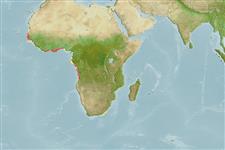>
Gobiiformes (Gobies) >
Gobiidae (Gobies) > Gobiinae
Etymology: Thorogobius: Greek, thoros = semen + Latin, gobius = gudgeon (Ref. 45335); alvheimi: Named for Oddgeir Alvheim of the Institute of Marine Research, Bergen, Norway..
Environment: milieu / climate zone / depth range / distribution range
Ecologia
marinhas; intervalo de profundidade 74 - 208 m (Ref. 118185). Deep-water
Distribuição
Países | Áreas da FAO | Ecossistemas | Ocorrências | Point map | Introduções | Faunafri
Eastern Atlantic: Angola and Ghana.
Tamanho / Peso / Idade
Maturity: Lm ? range ? - ? cm
Max length : 10.2 cm SL macho/indeterminado; (Ref. 118185); 7.2 cm SL (female)
Descrição suscinta
Chaves de identificação | Morfologia | Morfometria
Espinhos dorsais (total) : 7; Raios dorsais (total) : 11; Espinhos anais: 1; Raios anais : 10; Vértebras: 28. This species is distinguished from its congeners by the following characters: D1 VI (second and third distinctly elongated), D2 I,11; pectoral fin rays 20-21; complete pelvic disc with short with well-developed anterior membrane (frenum), lateral lobes pointed; nape and predorsal area naked; no scales on the opercle; scales in longitudinal series 27-31; supratemporal rows tr and trp developed and extending transversally between pores H and K; longitudinal row g is short, not passing row m posteriorly and distinctly distant from row h; long infraorbital row 6, ventrally extending to lower margin of preopercle, its ventral section 6i originating anterior to its dorsal section 6s; posterior lateral row h reaching anteriorly above posterior third of opercle; body depth 16.6-20.4% at anal-fin origin in SL; head width 42.9-53.8% in head length; upper jaw long 42.6-45.7% in head length; minimum height of caudal peduncle 34.8-50.2% in caudal peduncle length; large eyes 22.4-31.3% in head length; short caudal fin 27.1-32.3% in SL; body is uniformly pale fawn and brown with margin of scale pockets dark brown pigmented, yielding a reticulated pattern; presence of pale spots on nape and predorsal area; caudal fin is uniformly dusky greyish (Ref. 118185).
Specimens were dredged on the outer edge of the continental shelf and found on soft bottom (Ref. 118185).
Ciclo de vida ou comportamento de acasalamento
Maturities | Reprodução | Spawnings | Egg(s) | Fecundities | Larvas
Sauberer, M., T. Iwamoto and H. Ahnelt, 2018. Two new deep-water species of the genus Thorogobius (Teleostei: Gobiidae) from the upper continental slope of the Eastern Central Atlantic. Zootaxa 4429(2):357-371. (Ref. 118185)
Status na Lista Vermelha da UICN (Ref. 130435)
Ameaça para os humanos
Harmless
Uso pelos humanos
Ferramentas
Relatórios especiais
Baixar XML
Fontes da internet
Estimates based on models
Índice de diversidade filogenética (Ref.
82804): PD
50 = 0.5156 [Uniqueness, from 0.5 = low to 2.0 = high].
Bayesian length-weight: a=0.00708 (0.00333 - 0.01504), b=3.09 (2.92 - 3.26), in cm total length, based on LWR estimates for this (Sub)family-body shape (Ref.
93245).
Nível Trófico (Ref.
69278): 3.4 ±0.4 se; based on size and trophs of closest relatives
Resiliência (Ref.
120179): Elevada, tempo mínimo de duplicação da população menor que 15 meses (Preliminary K or Fecundity.).
Fishing Vulnerability (Ref.
59153): Low vulnerability (10 of 100).
